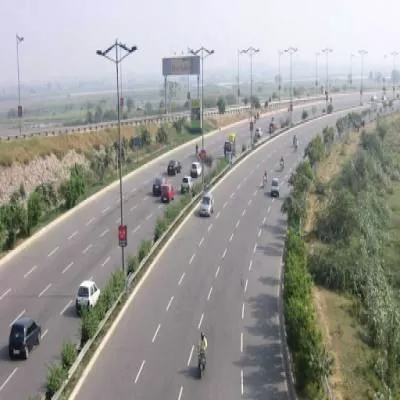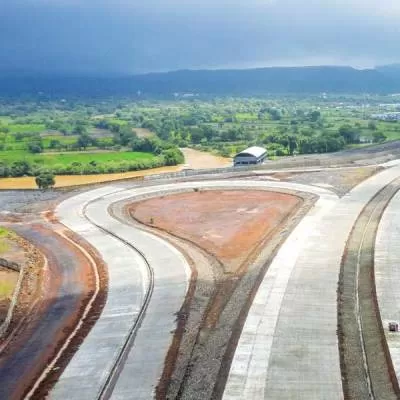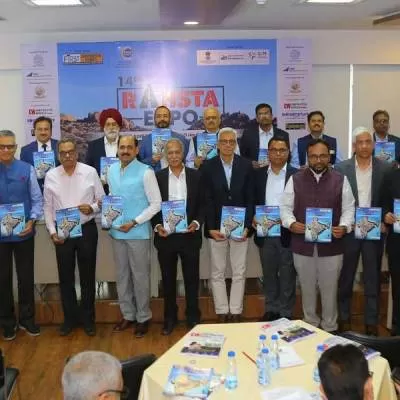- Home
- Infrastructure Transport
- ROADS & HIGHWAYS
- Newsmakers 2016

Newsmakers 2016
The year 2016 dawned with a sense of guarded anticipation - while much remained the same, some things were definitely changing, with metro projects progressing in a dozen Indian cities, road projects revving up to reach 30 km per day, and real-estate construction gathering momentum to build higher towers dotting the skyline. As months passed, the anticipation began to be replaced by optimism as the resurgence in India became increasingly evident. Laws were deleted and rules tweaked. Roads projects accelerated, the Railways restructured its orientation and airports prepared for takeoff. Smart cities replaced the urban renewal mission, and India was marketed globally like never before. The stage was set for a revival.
In this scenario, some achievers proved to be a cut above the rest, moving forward persistently, relentlessly, propelling their company and the industry to new highs. We call them -´Newsmakers´. CW has identified 30-odd personalities who stood out as our newsmakers this past year; read on to know why.
Infra rulers
In 2016, Dr Raghuram Rajan, then Governor of the Reserve Bank of India (RBI), was seen as a champion of infrastructure. Under his guidance, RBI relaxed overseas borrowings norms to help companies raise funds for infra projects in India. The central bank was also believed to have reviewed the extant ECB guidelines, after taking into account prevailing external funding sources, particularly for long-term lending and the critical needs of the infrastructure sector. RBI made headlines once again as Dr Rajan´s era came to an end, and Urjit Patel, who was deputy governor in charge of monetary policy, took charge as the next Governor.
Also, the government set up the National Investment and Infrastructure Fund (NIIF) to attract investment from domestic and international sources for infra development in commercially viable projects. To take forward its overall management and operations, Sujoy Bose was appointed as the CEO midyear.
Further, Takema Sakamoto, Chief Representative, Japan International Cooperation Agency (JICA), India, signed an agreement with IIFCL to provide a -Ñ50-billion (about Rs 2,866 crore) official development assistance loan as the principal for the implementation of PPP infrastructure financing projects. This loan will be available mainly to eco-friendly solar, wind and transmission projects. Sakamato told the media, ´Improved infrastructure in India will lead to increased per-capita productivity and improved quality of life.´
Some corporates were planning big. Mumbai-based Tata Realty and Infrastructure (TRIL), led by Sanjay G Ubale, Managing Director & CEO, laid plans to invest up to Rs 10,000 crore in the next few years in infrastructure projects such as light rail urban transport, airports, highways and roads, and ropeway projects. To increase its focus on public works, the company is also planning to launch an infrastructure investment trust (InvIT).
There´s more! CW takes you through our entire list, along with featured interviews with a few of our newsmakers.
ROADS
The roads sector continued to be the most action-packed in the infrastructure space, with a new set of contractors emerging as significant players in the EPC space. The government cleared several projects; for those short of money, it offered one-time capital infusion. Further, it plans to award 25,000 km in 2016-17, compared to 10,000 km awarded in 2015-16.
Meanwhile, connecting us to our neighbours was Leena Nandan, Joint Secretary, Ministry of Road Transport and Highways, whose zeal led to the approval of an ambitious 1.04-billion project for constructing and upgrading 558 km to link India with Bangladesh, Bhutan and Nepal. This will ease movement of passengers and cargo, part of the effort to increase inter-regional trade by 60 per cent.
This apart, Raghav Chandra, former Chairman, NHAI, and CW Man of the Year 2016, came to the rescue of firms stuck in litigation. He announced plans to release Rs 6,000 crore to developers stuck in litigation under the new arbitration policy. This is expected to help banks recover some stuck loans while providing funds for stalled projects. Later, in a major bureaucratic reshuffle, Yudhvir Singh Malik, was appointed the new Chairman of NHAI.
RAILWAYS
To bring in efficiency, the Railway Board underwent restructuring. Further, the Dedicated Freight Corridor Corporation (DFCC) project saw much traction. So much so that, after carving a niche in the roads, irrigation and industrial sectors, Gayatri Projects added a new feather to its cap by foraying into the fast-growing railway EPC sector. Led by TV Sandeep Kumar Reddy, Promoter & Managing Director, the company, in consortium with Japan´s Sojitz Corp and L&T, won a Rs 4,744-crore contract to design and build the Iqbalgarh-Vadodara section of the DFCC (read interview on page 77).
PORTS AND AIRPORTS
Both the ports and airports sectors witnessed crucial new appointments. Sanjay Bhatia, who was vice-chairman and managing director of CIDCO, was appointed Chairman of the Mumbai Port Trust (MbPT). And trust us, the tenders are raining down (read interview on page 62)! And the Airports Authority of India (AAI) welcomed its new Chairman Guruprasad Mohapatra with open wings. Mohapatra is now executing a turnaround plan to make the authority more profitable, with less crowded and more comfortable and efficient airports. At present, 25 proposed airport projects are set to undergo expansion and modernisation in the next five years (see list on page 85).
METROS
The execution of metro rail projects is never a smooth ride. However, Bengaluru´s Namma Metro (´Our Metro´ in Kannada) is nearing completion. Executed under the leadership of Pradeep Singh Kharola, Managing Director, Bangalore Metro Rail Corporation Ltd, the 18.1-km East-West corridor (Purple Line) journey, which includes a 4.8-km underground stretch, will take merely 40 minutes as against almost two hours by road. The city now eagerly awaits the inauguration of the entire 24.2-km North-South corridor, which will mark the completion of the 42.3-km Phase-I of the project.
Mumbai Metro Rail Corporation (MMRC) also found reason to celebrate as Metro 3 took a concrete step towards fruition. According to SK Gupta, Director/Projects, five consortia have been appointed for civil work. While the project is reportedly expected to take four to five years to complete, Gupta´s 17-year expertise at DMRC ensures it will be in good hands (read interview on page 70).
CEMENT
Large transactions led to significant consolidation in the cement sector. Adding strategic value to the existing cement business of Birla Corp, Harsh V Lodha, Chairman, hit the motherlode - the company acquired Reliance Infrastructure´s cement business for Rs 4,800 crore. With this, the total capacity of the company is set to increase to about 15.5 mtpa from its current 10 mtpa. Also, Hiren Patel, Managing Director, cemented Nirma as a conglomerate, as the company brought Lafarge India cement´s assets for Rs 9,400 crore. Nirma currently operates a 2-mtpa cement unit; now, its cement business is set to go to the next level.
Next, in one of the biggest deals in the domestic cement industry, Jaypee Group announced a part-sale of its cement business to Chairman Kumar Mangalam Birla´s UltraTech for Rs 15,900 crore. After this deal, the capacity of UltraTech rose to 91.1 mtpa, including its overseas operations, further strengthening its position in the country.
Apart from acquisitions, companies witnessed crucial additions. While KK Maheshwari took over as the new Managing Director of UltraTech Cement, Parth Jindal was appointed Managing Director of JSW Cement.
SMART CITIES
The Centre´s Smart Cities Mission caught up speed this year. Under Minister of Urban Development M Venkaiah Naidu, the first list of 20 smart cities was released in January; this was followed by the second list of 13 cities in May. Naidu took things to the next level when he announced the third list of 27 cities that qualified under the smart cities challenge. With this, a total of 60 smart cities have been chosen. At this rate, come January 2017, India may be ready with its comprehensive list of 100 smart cities.
This, of course, heralded opportunity for stakeholders. One company that made the headlines was L&T Construction. The Mumbai City Surveillance with over 6,000 CCTV cameras was a breakthrough project for the Smart World Communications business vertical of the company. Under the leadership of R Srinivasan, Vice President & Head-Smart World & Communication BU, the vertical also recently inked the deal to make Nagpur the first large-scale smart city (read interview on page 68).
POWER
Favourable government policies have boosted private investments in power generation over the last decade, resulting in several capacity additions. And 2016 was witness to significant events in this space.
For starters, WAPCOS - a Government of India undertaking under the Ministry of Water Resources, River Development and Ganga Rejuvenation -û under its dynamic Chairman-cum-Managing Director RK Gupta, executed and implemented a landmark infra project worth Rs 1,700 crore in Afghanistan. The project plans to irrigate 75,000 hectare and generate 42 MW of power.
Also, Claudio Facchin, President, ABB´s Power Grids Division, has been driving the country´s clean energy vision and push for solar power. ABB commissioned five substations to integrate a 648-MW solar project at Kamuthi in Tamil Nadu to the national transmission grid. The largest of its kind in the world, at full capacity, it accounts for about 10 per cent of the country´s current solar capacity of around 7 GW. What´s more, Azure Power, under the leadership of its Founder & CEO Inderpreet Singh Wadhwa, announced the country´s largest IPO in the solar sector. Meanwhile, Tata Power´s impressive nationwide resource and energy conservation movement Club Enerji, under the leadership of its CEO & Managing Director Anil Sardana, has been successful in spreading awareness about resource conservation across the country (read interview on page 64).
Further, it was a proud moment for India when Schneider Electric India´s Managing Director & Country President Anil Chaudhry was conferred the highest French civilian award, Chevalier de la Légion d´Honneur (Knight of the Legion of Honour), for his significant and commendable contribution towards strengthening Indo-French relations through his association with French organisations (read interview on page 74).
REAL ESTATE
Demonetisation is expected to have a significant impact on the real-estate sector. Housing prices in 42 major cities across India could drop by up to 30 per cent over six to 12 months from now, wiping out over Rs 8 lakh crore of market value of residential properties sold and unsold by developers since 2008. This apart, the year 2016 witnessed some great moves. Ajay Piramal, Chairman, Piramal Group, gave fresh impetus to his ambitions by floating a Rs 15,000-crore fund to finance real-estate developers. And under the leadership of Khushru Jijina, Managing Director, Piramal Fund Management (PFM), the company invested Rs 2,320 crore across several projects of the Lodha Group in Mumbai, in what is known to be the single largest debt transaction in the realty funding space. In fact, PFM has been constantly making headlines for funding several real-estate projects.
Manoj Menda, Co-Founder, RMZ Corp, took the lead in driving the company´s mega deal of buying Essar Group´s Equinox Business Park in Mumbai for about Rs 2,400 crore - one of the biggest deals in the office space. The company is now expected to extend its core businesses into the growing markets.
Further, in the largest commercial property deal in the country, Niranjan Hiranandani, Managing Director, Hiranandani Group, signed an agreement with Canada´s Brookfield Asset Management to sell its 4 million sq ft of office and retail space at Powai in Mumbai (read interview on page 76).
What´s more, it was announced that the world will soon have its largest freestanding clock tower, to be built on Infosys Founder and former chairman NR Narayana Murthy´s dream project: The 345-acre Global Education Centre in Mysuru, Karnataka. The proposed tower is said to be taller than Big Ben (96 m) in London with its height of 135 m; the structure will incur a cost of about $8.83 million. Indeed, an exciting year! And to add to this, is the bold demonetisation move by Prime Minister Narendra Modi. This, along with other changes at the policy level, is expected to have an impact on the construction and real estate sector in a big way and CW, in its January 2017 edition, will delve into and report on the industry´s ´Action Plan in 2017´ in this scenario.
And, as we cheer all our Newsmakers of 2016 for their achievements, we wish them and the entire construction sector a successful 2017.
CW retraces the journey of the industry leaders who made headlines this past year and reconnects with some of them to gauge the way forward. The year 2016 dawned with a sense of guarded anticipation - while much remained the same, some things were definitely changing, with metro projects progressing in a dozen Indian cities, road projects revving up to reach 30 km per day, and real-estate construction gathering momentum to build higher towers dotting the skyline. As months passed, the anticipation began to be replaced by optimism as the resurgence in India became increasingly evident. Laws were deleted and rules tweaked. Roads projects accelerated, the Railways restructured its orientation and airports prepared for takeoff. Smart cities replaced the urban renewal mission, and India was marketed globally like never before. The stage was set for a revival. In this scenario, some achievers proved to be a cut above the rest, moving forward persistently, relentlessly, propelling their company and the industry to new highs. We call them -´Newsmakers´. CW has identified 30-odd personalities who stood out as our newsmakers this past year; read on to know why. Infra rulers In 2016, Dr Raghuram Rajan, then Governor of the Reserve Bank of India (RBI), was seen as a champion of infrastructure. Under his guidance, RBI relaxed overseas borrowings norms to help companies raise funds for infra projects in India. The central bank was also believed to have reviewed the extant ECB guidelines, after taking into account prevailing external funding sources, particularly for long-term lending and the critical needs of the infrastructure sector. RBI made headlines once again as Dr Rajan´s era came to an end, and Urjit Patel, who was deputy governor in charge of monetary policy, took charge as the next Governor. Also, the government set up the National Investment and Infrastructure Fund (NIIF) to attract investment from domestic and international sources for infra development in commercially viable projects. To take forward its overall management and operations, Sujoy Bose was appointed as the CEO midyear. Further, Takema Sakamoto, Chief Representative, Japan International Cooperation Agency (JICA), India, signed an agreement with IIFCL to provide a -Ñ50-billion (about Rs 2,866 crore) official development assistance loan as the principal for the implementation of PPP infrastructure financing projects. This loan will be available mainly to eco-friendly solar, wind and transmission projects. Sakamato told the media, ´Improved infrastructure in India will lead to increased per-capita productivity and improved quality of life.´ Some corporates were planning big. Mumbai-based Tata Realty and Infrastructure (TRIL), led by Sanjay G Ubale, Managing Director & CEO, laid plans to invest up to Rs 10,000 crore in the next few years in infrastructure projects such as light rail urban transport, airports, highways and roads, and ropeway projects. To increase its focus on public works, the company is also planning to launch an infrastructure investment trust (InvIT). There´s more! CW takes you through our entire list, along with featured interviews with a few of our newsmakers. ROADS The roads sector continued to be the most action-packed in the infrastructure space, with a new set of contractors emerging as significant players in the EPC space. The government cleared several projects; for those short of money, it offered one-time capital infusion. Further, it plans to award 25,000 km in 2016-17, compared to 10,000 km awarded in 2015-16. Meanwhile, connecting us to our neighbours was Leena Nandan, Joint Secretary, Ministry of Road Transport and Highways, whose zeal led to the approval of an ambitious 1.04-billion project for constructing and upgrading 558 km to link India with Bangladesh, Bhutan and Nepal. This will ease movement of passengers and cargo, part of the effort to increase inter-regional trade by 60 per cent. This apart, Raghav Chandra, former Chairman, NHAI, and CW Man of the Year 2016, came to the rescue of firms stuck in litigation. He announced plans to release Rs 6,000 crore to developers stuck in litigation under the new arbitration policy. This is expected to help banks recover some stuck loans while providing funds for stalled projects. Later, in a major bureaucratic reshuffle, Yudhvir Singh Malik, was appointed the new Chairman of NHAI. RAILWAYS To bring in efficiency, the Railway Board underwent restructuring. Further, the Dedicated Freight Corridor Corporation (DFCC) project saw much traction. So much so that, after carving a niche in the roads, irrigation and industrial sectors, Gayatri Projects added a new feather to its cap by foraying into the fast-growing railway EPC sector. Led by TV Sandeep Kumar Reddy, Promoter & Managing Director, the company, in consortium with Japan´s Sojitz Corp and L&T, won a Rs 4,744-crore contract to design and build the Iqbalgarh-Vadodara section of the DFCC (read interview on page 77). PORTS AND AIRPORTS Both the ports and airports sectors witnessed crucial new appointments. Sanjay Bhatia, who was vice-chairman and managing director of CIDCO, was appointed Chairman of the Mumbai Port Trust (MbPT). And trust us, the tenders are raining down (read interview on page 62)! And the Airports Authority of India (AAI) welcomed its new Chairman Guruprasad Mohapatra with open wings. Mohapatra is now executing a turnaround plan to make the authority more profitable, with less crowded and more comfortable and efficient airports. At present, 25 proposed airport projects are set to undergo expansion and modernisation in the next five years (see list on page 85). METROS The execution of metro rail projects is never a smooth ride. However, Bengaluru´s Namma Metro (´Our Metro´ in Kannada) is nearing completion. Executed under the leadership of Pradeep Singh Kharola, Managing Director, Bangalore Metro Rail Corporation Ltd, the 18.1-km East-West corridor (Purple Line) journey, which includes a 4.8-km underground stretch, will take merely 40 minutes as against almost two hours by road. The city now eagerly awaits the inauguration of the entire 24.2-km North-South corridor, which will mark the completion of the 42.3-km Phase-I of the project. Mumbai Metro Rail Corporation (MMRC) also found reason to celebrate as Metro 3 took a concrete step towards fruition. According to SK Gupta, Director/Projects, five consortia have been appointed for civil work. While the project is reportedly expected to take four to five years to complete, Gupta´s 17-year expertise at DMRC ensures it will be in good hands (read interview on page 70). CEMENT Large transactions led to significant consolidation in the cement sector. Adding strategic value to the existing cement business of Birla Corp, Harsh V Lodha, Chairman, hit the motherlode - the company acquired Reliance Infrastructure´s cement business for Rs 4,800 crore. With this, the total capacity of the company is set to increase to about 15.5 mtpa from its current 10 mtpa. Also, Hiren Patel, Managing Director, cemented Nirma as a conglomerate, as the company brought Lafarge India cement´s assets for Rs 9,400 crore. Nirma currently operates a 2-mtpa cement unit; now, its cement business is set to go to the next level. Next, in one of the biggest deals in the domestic cement industry, Jaypee Group announced a part-sale of its cement business to Chairman Kumar Mangalam Birla´s UltraTech for Rs 15,900 crore. After this deal, the capacity of UltraTech rose to 91.1 mtpa, including its overseas operations, further strengthening its position in the country. Apart from acquisitions, companies witnessed crucial additions. While KK Maheshwari took over as the new Managing Director of UltraTech Cement, Parth Jindal was appointed Managing Director of JSW Cement. SMART CITIES The Centre´s Smart Cities Mission caught up speed this year. Under Minister of Urban Development M Venkaiah Naidu, the first list of 20 smart cities was released in January; this was followed by the second list of 13 cities in May. Naidu took things to the next level when he announced the third list of 27 cities that qualified under the smart cities challenge. With this, a total of 60 smart cities have been chosen. At this rate, come January 2017, India may be ready with its comprehensive list of 100 smart cities. This, of course, heralded opportunity for stakeholders. One company that made the headlines was L&T Construction. The Mumbai City Surveillance with over 6,000 CCTV cameras was a breakthrough project for the Smart World Communications business vertical of the company. Under the leadership of R Srinivasan, Vice President & Head-Smart World & Communication BU, the vertical also recently inked the deal to make Nagpur the first large-scale smart city (read interview on page 68). POWER Favourable government policies have boosted private investments in power generation over the last decade, resulting in several capacity additions. And 2016 was witness to significant events in this space. For starters, WAPCOS - a Government of India undertaking under the Ministry of Water Resources, River Development and Ganga Rejuvenation -û under its dynamic Chairman-cum-Managing Director RK Gupta, executed and implemented a landmark infra project worth Rs 1,700 crore in Afghanistan. The project plans to irrigate 75,000 hectare and generate 42 MW of power. Also, Claudio Facchin, President, ABB´s Power Grids Division, has been driving the country´s clean energy vision and push for solar power. ABB commissioned five substations to integrate a 648-MW solar project at Kamuthi in Tamil Nadu to the national transmission grid. The largest of its kind in the world, at full capacity, it accounts for about 10 per cent of the country´s current solar capacity of around 7 GW. What´s more, Azure Power, under the leadership of its Founder & CEO Inderpreet Singh Wadhwa, announced the country´s largest IPO in the solar sector. Meanwhile, Tata Power´s impressive nationwide resource and energy conservation movement Club Enerji, under the leadership of its CEO & Managing Director Anil Sardana, has been successful in spreading awareness about resource conservation across the country (read interview on page 64). Further, it was a proud moment for India when Schneider Electric India´s Managing Director & Country President Anil Chaudhry was conferred the highest French civilian award, Chevalier de la Légion d´Honneur (Knight of the Legion of Honour), for his significant and commendable contribution towards strengthening Indo-French relations through his association with French organisations (read interview on page 74). REAL ESTATE Demonetisation is expected to have a significant impact on the real-estate sector. Housing prices in 42 major cities across India could drop by up to 30 per cent over six to 12 months from now, wiping out over Rs 8 lakh crore of market value of residential properties sold and unsold by developers since 2008. This apart, the year 2016 witnessed some great moves. Ajay Piramal, Chairman, Piramal Group, gave fresh impetus to his ambitions by floating a Rs 15,000-crore fund to finance real-estate developers. And under the leadership of Khushru Jijina, Managing Director, Piramal Fund Management (PFM), the company invested Rs 2,320 crore across several projects of the Lodha Group in Mumbai, in what is known to be the single largest debt transaction in the realty funding space. In fact, PFM has been constantly making headlines for funding several real-estate projects. Manoj Menda, Co-Founder, RMZ Corp, took the lead in driving the company´s mega deal of buying Essar Group´s Equinox Business Park in Mumbai for about Rs 2,400 crore - one of the biggest deals in the office space. The company is now expected to extend its core businesses into the growing markets. Further, in the largest commercial property deal in the country, Niranjan Hiranandani, Managing Director, Hiranandani Group, signed an agreement with Canada´s Brookfield Asset Management to sell its 4 million sq ft of office and retail space at Powai in Mumbai (read interview on page 76). What´s more, it was announced that the world will soon have its largest freestanding clock tower, to be built on Infosys Founder and former chairman NR Narayana Murthy´s dream project: The 345-acre Global Education Centre in Mysuru, Karnataka. The proposed tower is said to be taller than Big Ben (96 m) in London with its height of 135 m; the structure will incur a cost of about $8.83 million. Indeed, an exciting year! And to add to this, is the bold demonetisation move by Prime Minister Narendra Modi. This, along with other changes at the policy level, is expected to have an impact on the construction and real estate sector in a big way and CW, in its January 2017 edition, will delve into and report on the industry´s ´Action Plan in 2017´ in this scenario. And, as we cheer all our Newsmakers of 2016 for their achievements, we wish them and the entire construction sector a successful 2017.




















